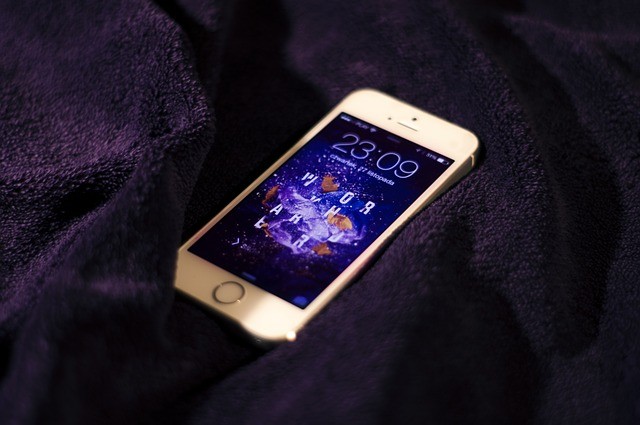How your mobile devices is harming our sleep and cardiovascular health. Check out the article we found over at Top 10 Home Remedies.
Most of us have a hard time recalling how we ever survived without the convenience of handy electronic devices like cell phones, tablets and net-books. Technology has infiltrated every aspect of our lives.
Those who frequented bookstores no longer feel the need to hold a paperback in their hands. They make do with e-books available on their tablets.
While examples of the social impact of technology are abound, there is another concern that is seldom discussed: The impact of technology on health.
The increasing use of technology and electronic devices poses serious health hazards. The World Health Organization (WHO) reported there were 6.9 billion cell phone subscriptions worldwide in 2014.
The tablets and phones that you and your children glue your eyes to before bed each night to send texts, read e-books, play games or simply browse the web is more harmful to your sleep and overall health than you realize.
How Technology Affects Sleep
In today’s modern world, many people stay out late at night and start early the next day. They consume caffeine excessively and overwork themselves. These are some primary reasons that people lack sufficient sleep.However, an often neglected and lesser-discussed factor is electronic light. Light emanating from electronics affects the circadian rhythm of your body in major ways.
The circadian rhythm is defined as the pattern of mental, behavioral and physical changes that a person undergoes in a whole day.
It is affected by lightness and darkness, and is responsible for inducing sleep. This is the reason your body goes into sleepy-mode between midnight and 4 a.m.
The queasy, tired and strained feelings you suffer after you pull an all-nighter, travel between time zones or sleep less than 4 hours is your body’s circadian rhythm going haywire.
Electronic artificial light between dusk until dawn sends the wrong messages to the hypothalamus, a hormone-producing gland. It triggers the hypothalamus to produce neurons that promote wakefulness and inhibit neurons that induce sleep.
It also inhibits the production of melatonin, the body’s major sleep-producing hormone, thereby causing sleeplessness, making you alert at inappropriate hours and undermining the quality of whatever little sleep you do get.
Using electronics during the day severely harms sleep in adolescents, according to another 2015 study published in BMJ Open.
The study asked 10,000 Norwegian teenagers (ages 16 to 19 years old) how much time they spent in front of an electronic screen (cell phone, tablet, video games, television, etc.), as well as how long and how well they slept.
The subjects reported taking more than an hour to fall asleep at night on days they spent time in front of an electronic screen during the day and right before bed.
Spending time in front of a cell phone, computer or mp3 device screen was especially associated with delayed and poor sleep.
Technology, Sleeplessness & Cardiovascular Health
Sleep is one of the foundations of good health. Without adequate and sound sleep, a person runs a higher risk of contracting illnesses, some of which could even be potentially fatal.
About 50 to 70 million Americans suffer a chronic sleep disorder, which severely obstructs their daily routine and undermines the quality of their health and overall lives.
The tendency to fall asleep during the day, difficulty falling asleep and/or maintaining sleep at night, as well as physical problems like excessive snoring and breathing problems all constitute sleep disorders and could be its accompanying symptoms.
Here’s how the different conditions that constitute metabolic syndrome are linked to sleep deprivation and promote heart disease.
1. Obesity
Disrupted circadian rhythm and subsequent sleep pattern may cause obesity, according to a 2007 study published in Obesity Reviews.
The circadian rhythms of your body regulate sleep and wakefulness, as mentioned previously. However, what this means on a cellular level is that it also regulates the periods of activity and inactivity of your cells.
When your cells are active, they engage increasingly in transporting nutrients and hormones, as well as fat cells and triglycerides.
A disturbed and unpredictable sleep/wake pattern alters the body’s metabolic process significantly, and may trigger accumulation of fat cells. This causes obesity.
2. Diabetes
Sleeplessness can interfere with the body’s ability to manage excess glucose through insulin and keep the blood sugar levels in check.
Sleep deprivation at night can hamper glucose utilization and increase insulin levels, causing diabetes.
People who slept less than 5 hours each night reported a 37 percent increased risk of developing diabetes over 10 years, according to a 2003 study published in Diabetes Care.
People who reported disturbed and broken sleep throughout the night, as well as those who slept 5 hours or less, were found to develop a significantly greater risk of Type 2 diabetes over a course of 12 years, according to a 2005 study published in Diabetes Care.
3. Hypertension
Shorter duration of nighttime sleep is associated with an elevated risk of developing hypertension, according to a 2013 study published in Sleep Medicine.
Poor sleep or sleep deprivation can strain your heart and increase pressure on the blood flow through your arteries over a prolonged period, causing your body to retain high levels of sodium thereby increasing hypertension.
Out of 4,810 middle-aged people, those who slept less than 5 hours reported a 60 percent increased risk of hypertension during an 8- to 10-year follow-up period, according to a 2006 study published in Hypertension.
Moreover, non-restive sleep or complete lack of sleep also activates the body’s sympathetic nervous system. The sympathetic nervous system is the body’s way of responding to strain and increased physical activity. In other words, it is the body’s state of emergency.
Lack of sleep triggered the body’s sympathetic nervous system and contributed to an increased risk of hypertension in subjects, according to a 2006 study published in Hypertension.
Next Article: Is Our Wi-Fi Killing Us Slowly?
Read full article: Your Mobile Phone and Tablet Use in Bed is Harming Your Sleep & Cardiovascular Health







Recent Comments